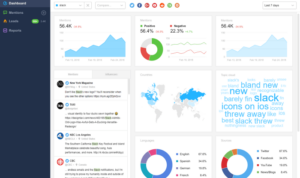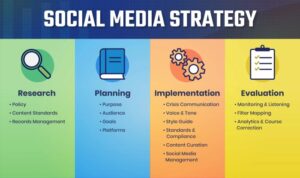Using Social Media Analytics Tools is like unlocking a treasure trove of insights in the fast-paced world of digital marketing. Dive into the realm of data-driven decisions and strategic marketing with this comprehensive guide.
Introduction to Social Media Analytics Tools

Social media analytics tools are platforms or software that help businesses track, analyze, and interpret data from their social media accounts. These tools play a crucial role in the digital marketing landscape by providing insights into audience behavior, content performance, and overall social media strategy effectiveness.
Significance of Social Media Analytics Tools
Social media analytics tools enable businesses to make informed decisions based on data-driven insights. By monitoring key metrics such as engagement, reach, and conversions, marketers can optimize their social media campaigns for better results. These tools also help in identifying trends, understanding audience preferences, and measuring the impact of marketing efforts.
Popular Social Media Analytics Tools
- Hootsuite: A comprehensive social media management tool that offers analytics features to track performance across multiple platforms.
- Google Analytics: While not specific to social media, Google Analytics provides valuable insights into website traffic originating from social media platforms.
- Sprout Social: Known for its robust reporting capabilities, Sprout Social offers in-depth analytics to monitor social media performance and audience engagement.
- Buffer Analyze: Buffer’s analytics tool provides detailed performance metrics for social media posts, helping businesses understand what content resonates with their audience.
Types of Social Media Analytics Tools

Social media analytics tools come in various types, each serving a specific purpose in helping businesses understand and improve their social media presence. Let’s explore some of the key types of social media analytics tools:
1. Listening Tools
Listening tools allow businesses to monitor and analyze conversations happening on social media platforms. They help in tracking brand mentions, customer feedback, and industry trends. Some features offered by listening tools include sentiment analysis, tracking, and real-time monitoring of social media interactions.
2. Engagement Tools
Engagement tools focus on measuring the level of interaction and engagement with the audience on social media. These tools provide insights into the performance of social media posts, audience response rates, and overall engagement metrics. Features of engagement tools include analytics on likes, comments, shares, and click-through rates.
3. Competitive Analysis Tools
Competitive analysis tools help businesses compare their social media performance with that of their competitors. These tools offer insights into competitor strategies, audience demographics, content performance, and overall market positioning. Features of competitive analysis tools include benchmarking metrics, competitor tracking, and performance comparison reports.
Free vs. Paid Social Media Analytics Tools, Using Social Media Analytics Tools
When it comes to social media analytics tools, businesses have the option to choose between free and paid tools. Free tools typically offer basic analytics functionalities such as follower counts, post metrics, and basic engagement data. On the other hand, paid tools provide more advanced features like in-depth audience insights, custom reporting, and competitive benchmarking capabilities. While free tools may be suitable for small businesses with limited budgets, paid tools are recommended for larger enterprises looking to gain comprehensive insights and competitive advantage in the social media landscape.
Benefits of Using Social Media Analytics Tools
Social media analytics tools offer a plethora of advantages for businesses looking to enhance their online presence and marketing strategies. From improved targeting to increased ROI, these tools play a crucial role in optimizing social media efforts.
Improved Targeting
One of the key benefits of using social media analytics tools is the ability to precisely target specific audiences based on demographics, interests, and behaviors. By analyzing data insights, businesses can tailor their content and ads to reach the right people, increasing the chances of engagement and conversions.
Enhanced Customer Engagement
Through social media analytics tools, businesses can gain valuable insights into customer preferences, sentiments, and interactions. This data can be used to create more personalized and relevant content, leading to higher levels of engagement and loyalty among followers.
Increased ROI
By monitoring and measuring the performance of social media campaigns, businesses can optimize their marketing strategies to achieve a higher return on investment. Social media analytics tools help in identifying the most effective tactics, allocating resources efficiently, and maximizing the impact of every marketing dollar spent.
Case Studies and Success Stories
Several businesses have successfully leveraged social media analytics tools to achieve remarkable results. For example, a clothing brand used analytics data to identify the most popular products among their target audience, resulting in a 30% increase in sales. Another case study showed how a restaurant chain improved customer satisfaction by responding promptly to feedback on social media, leading to a significant boost in customer retention rates.
Monitoring Marketing Campaigns
Social media analytics tools provide real-time monitoring and measurement of marketing campaigns, allowing businesses to track performance metrics such as reach, engagement, and conversion rates. This data enables marketers to make data-driven decisions, adjust strategies on the fly, and optimize campaign performance for better results.
Best Practices for Using Social Media Analytics Tools
When it comes to utilizing social media analytics tools effectively, there are several key best practices that can help you make the most out of your data and optimize your marketing strategies.
Setting Specific Goals
- Before diving into social media analytics, it’s crucial to establish clear and specific goals that you want to achieve through your social media efforts. Whether it’s increasing brand awareness, driving website traffic, or boosting engagement, defining your objectives will guide your analysis and decision-making process.
- Setting SMART goals (Specific, Measurable, Achievable, Relevant, Time-bound) can provide a framework for tracking your progress and success metrics.
Tracking Relevant Metrics
- Identify the key performance indicators (KPIs) that align with your goals and focus on tracking metrics that are relevant to your objectives. This could include reach, engagement rates, click-through rates, conversion rates, and sentiment analysis.
- Regularly monitoring these metrics will help you gauge the effectiveness of your social media campaigns and make data-driven decisions to optimize your strategies.
Interpreting Data for Optimization
- When analyzing data from social media analytics tools, look beyond surface-level numbers and dig deeper into the insights provided. Identify trends, patterns, and correlations that can help you understand audience behavior and preferences.
- Use this information to fine-tune your content strategy, adjust posting schedules, and personalize your messaging to better resonate with your target audience.
Staying Updated with Latest Trends
- Social media landscape is constantly evolving, with new platforms, features, and trends emerging regularly. It’s essential to stay informed about the latest advancements in social media analytics tools to leverage new opportunities and stay ahead of the competition.
- Engage with industry publications, attend webinars, and participate in relevant forums to keep abreast of the latest trends and best practices in social media analytics.





